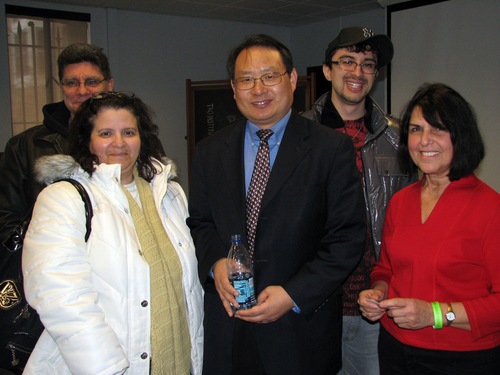Story of a Psychiatrist and Acupuncturist: Chinese Medicine, Mind and Body Integration, and Falun Gong
(Minghui.org) Dr. Yang Jingduan, a board-certified psychiatrist and a fifth-generation Chinese medicine physician, is a poster boy for the American dream by any measure. Through hard work and dedication, the first-generation immigrant has a successful medical practice and loving family, and is at peace with the world around him.
When asked about his experiences, Dr. Yang points to the importance of one's outlook and sense of perspective, and the summer of 1998, when his life changed for good.
“This Practice Was a Keeper”
Dr. Yang was teaching Chinese medicine at the Minnesota College of Acupuncture and Oriental Medicine in 1998, having just come from China two years prior. He had a lot on his plate, dealing with a relatively new job, new environment, preparing for the United States Medical Licensing Examination (USMLE), and the denial of his eight-year-old son's visa application to join him and his wife in the United States. There was an unmistakable tension at home, as the stress mounted.
Dr. Yang knew the harmful effects of smoking all too well as a doctor, but couldn't quit. The stress had led to a two-pack-a-day habit that he couldn't kick, no matter what he tried. As a fifth generation Chinese medical doctor, he had tried Taichi, but stayed away from qigong because he did not fully understand it at that point.
Knowing his situation, Dr. Yang's mother, older sister, and uncle all urged him to try Falun Gong, an ancient meditation practice that they had started doing. In the summer of 1998, he rented a Falun Gong exercise video cassette from a Chinese grocery store and started learning the exercises on his own.
Dr. Yang realized after two weeks that his mood had become much calmer and more stable. Remarkably, he stopped smoking almost as an afterthought.
“I know exactly how hard such changes are to come by,” Dr. Yang said, “I know how difficult it is to adjust one's mood, and I know how difficult it is to quit smoking.” This practice was a keeper, he told himself.
Deeper Insights into Traditional Chinese Medicine
The benefit didn't end there. Practicing Falun Gong helped Dr. Yang gain new insights into traditional Chinese medicine. Dr. Yang had learned the basics from his family practice, but did not know the underlying principles as well as he desired.
For example, traditional Chinese medicine emphasizes the “integration of heaven and man.” But how? Through practicing Falun Gong, Dr. Yang came to realize that human beings are fundamentally a form of energy. Thus, the human body can be integrated into nature, which is all about energy as well. The concept of merging mind and body became more real for him.
Traditional Chinese medicine also stresses virtue. Dr. Yang used to think that it had nothing to do with medicine, but through practicing Falun Gong, he came to realize that mind and body were one, and that virtue represents positive energy, which in turn leads to good health.
Dr. Yang knew that Falun Gong was more than just exercises. It was a different way of seeing the world—a perspective that was different than the way many perceive the world today, and closer to the wisdom of his ancestors.
 After giving “A Brief Introduction to Chinese Medicine” speech, Dr. Yang (center) posed for a photo with some audience members at the 30th Annual Chinese New Year Celebration on Saturday, February 12, 2011, in the Museum of Archaeology and Anthropology at the University of Pennsylvania.
After giving “A Brief Introduction to Chinese Medicine” speech, Dr. Yang (center) posed for a photo with some audience members at the 30th Annual Chinese New Year Celebration on Saturday, February 12, 2011, in the Museum of Archaeology and Anthropology at the University of Pennsylvania.
Helping Patients through His Practice
Dr. Yang's life is at a different place now. He's the founder and medical director of TAO Institute of Mind & Body Medicine. In addition to practicing in New York, Pennsylvania, and New Jersey, Dr. Yang also practices medicine and serves as director of the Oriental Medicine and Acupuncture Program at the Myrna Brind Center of Integrative Medicine at Thomas Jefferson University Hospital in Philadelphia, Pennsylvania.
He is busier than ever, but he has his stress under control and not via smoking. He has not smoked a single cigarette for almost 16 years.
“The work is still of the same nature, quite demanding, and it can be all-consuming at times. But my state of mind is calm. I no longer have to have something or have to make things go a certain way,” Dr. Yang shares, “The process is more important to me than forcing a certain result.”
Establishing connections with patients, his staff, and colleagues are very important to him. While he was previously quite business oriented and wouldn't tolerate a patient repeatedly missing appointments, he is now much more accommodating and understanding.
“Giving up on personal gain was something hard for me to do before I started practicing Falun Gong,” he says.
According to Dr. Yang, Falun Gong has helped him achieve a sense of balance and harmony with the world around him. It has connected him to his family and his profession, and integrated the mind and body for him as an individual. “This is something universal that can help everyone.”
